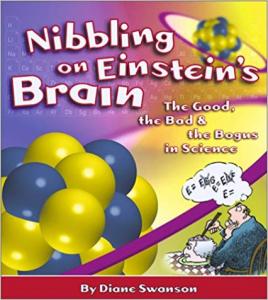
"At one time cannibals in New Guinea believed they could absorb the skills and knowledge of their enemies by eating their brains."
Believe it or not, in the 1950s and 1960s competent scientists actually tested an "edible memory theory." Only through the time-honored tradition of scientists cross-checking one another's results did the theory get discarded.
Science is everywhere! It's astonishing to what extent it pervades our lives, influencing us on a daily basis. But there is a lot of faulty and phony research, and it's difficult for the public to discern what science is good and what is false or misleading. Nibbling on Einstein's Brain takes a fun yet informative look at the scientific facts that constantly bombard us.
How can we equip ourselves to better judge what is good and what is suspect? First we must examine how good science works. And don't worry, there is plenty of good science out there. You'll learn how to follow a "scientific method" for developing theories, designing research to test those theories, and analyzing the results in order to reach conclusions. You'll be amazed at how fascinating the process can be. Now go back: is the initial theory still sound? Good science is always checked and rechecked, both by the original scientist and by others in the field.
"At one time cannibals in New Guinea believed they could absorb the skills and knowledge of their enemies by eating their brains."
Believe it or not, in the 1950s and 1960s competent scientists actually tested an "edible memory theory." Only through the time-honored tradition of scientists cross-checking one another's results did the theory get discarded.
Science is everywhere! It's astonishing to what extent it pervades our lives, influencing us on a daily basis. But there is a lot of faulty and phony research, and it's difficult for the public to discern what science is good and what is false or misleading. Nibbling on Einstein's Brain takes a fun yet informative look at the scientific facts that constantly bombard us.
How can we equip ourselves to better judge what is good and what is suspect? First we must examine how good science works. And don't worry, there is plenty of good science out there. You'll learn how to follow a "scientific method" for developing theories, designing research to test those theories, and analyzing the results in order to reach conclusions. You'll be amazed at how fascinating the process can be. Now go back: is the initial theory still sound? Good science is always checked and rechecked, both by the original scientist and by others in the field.

